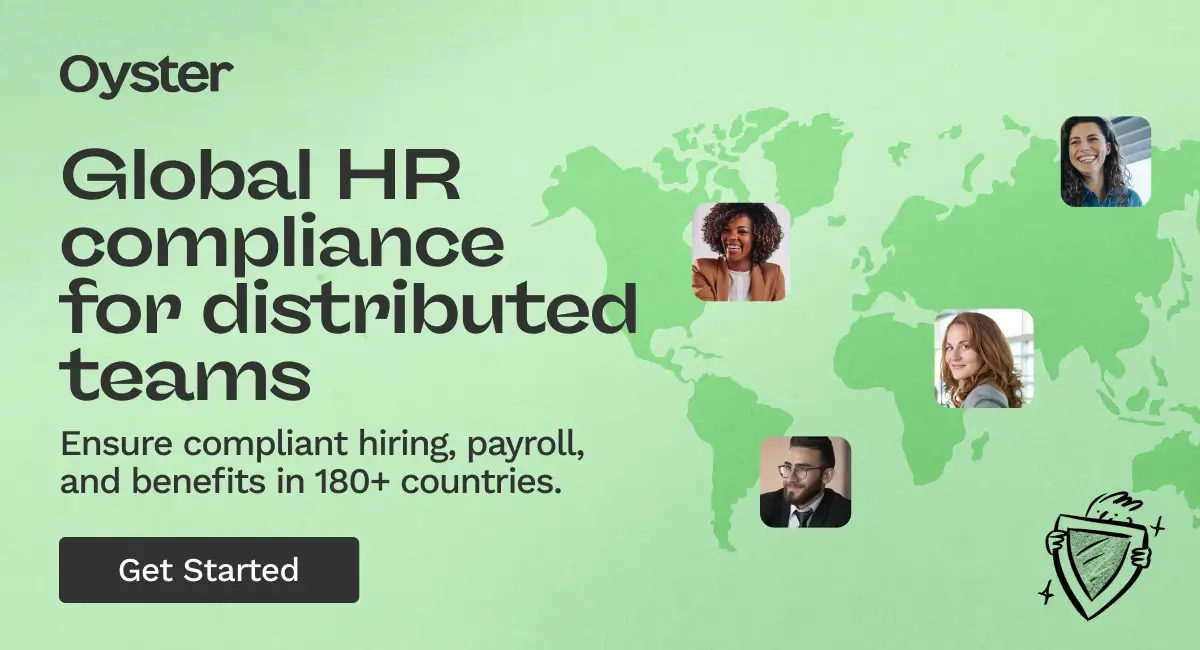What is global risk management?

Global risk management
Thanks to advances in telecommunications technology and more open attitudes toward remote work, companies are increasingly hiring globalized teams; what started with just 6.5% of private sector employees working from home in 2019 became a massive experiment in full-time remote work during the pandemic. There's no need for companies to limit their hiring to their immediate geographical area anymore.
While sourcing talent from a wider group of people than ever before offers many benefits, there are also potential risks. Global risk management refers to the steps companies take and the policies they implement to reduce the potential risks that may arise when setting up and managing a worldwide workforce.
Employers and human resources leaders should develop a cohesive global risk management strategy before hiring abroad. Discover the potential drawbacks of international hiring and how to establish a global risk management strategy below.
Why global risk management matters for international hiring
So, what exactly is global risk management? It's the comprehensive approach companies use to identify, assess, and mitigate employment-related risks when hiring internationally—from compliance violations to worker misclassification penalties.
Building a global team opens your company up to a world of talent, but every country has its own employment laws, tax regulations, and compliance requirements. A strong risk management strategy protects your business, ensures fair treatment of team members, and allows confident expansion without costly legal mistakes.
Challenges of international hiring and elements of a global risk management solution
International hiring adds complexity to every step of the HR process. Here are the key risks any global risk management solution should address:
Incorrect work classification
Getting worker classification wrong can be expensive. Here's what's at stake:
- Self-employed workers: Handle their own taxes, social security, and benefits
- Employees: Require employer-managed payroll, taxes, and statutory benefits
- Misclassification penalties: Can result in significant fines and back payments
Regulatory compliance issues
Different countries have their own rules regarding things like vacation time, overtime pay, sick leave, and more. It's up to companies to research the relevant labor laws and make sure they are in compliance. Otherwise, they could face issues like fines.
Contract details
Most countries require employer-employee relationships to be firmed up in a formal contract. However, countries have varying legislation around what those contracts should include. For example, some countries don't allow a "trial period" for workers. Laws regarding termination notices also vary by country.
Insurance requirements
Depending on the type of role and job title, employers may be responsible for providing insurance for their workers. This could include health insurance, plus extras like vision and dental, as well as worker's compensation or similar liability insurance.
Intellectual property (IP) problems
IP can be a hot topic for many companies. However, IP laws aren't globalized. Companies that don't have a legal entity in a given country may struggle to adhere to IP laws, and research shows that the strength of these laws directly impacts business decisions; for example, U.S. firms with extensive patents have been shown to increase technology transfer and R&D after a country strengthens its IP rights, with some affiliates seeing increases in royalty payments exceeding 30%. If employees in those countries are handling delicate, IP-sensitive information, this can get tricky.
With all these points in mind, a basic global risk management solution might seem limited. Additional factors may be relevant, depending on the company developing the strategy.
Developing a global risk management strategy
Ready to build your strategy? Start with these essential steps:
- Risk assessment: Identify specific compliance requirements for each target country
- Policy documentation: Create standardized procedures for contracts, payroll, and benefits
- Technology integration: Implement systems that automate compliance checks and reporting
- Expert consultation: Partner with local legal and HR specialists in key markets
The investment in proper planning pays off by preventing costly compliance violations and enabling confident global expansion.
Best practices for implementing global risk management
A strategy is only as good as its execution. Once you understand the risks, the next step is to put a plan into action. Here are a few best practices to guide you:
- Document everything: Create clear, written policies for hiring, paying, and managing global team members. This ensures consistency and provides a reference for your team.
- Consult local experts: Employment law is not universal. Partner with legal and HR experts in each country to ensure your contracts, benefits, and payroll practices are fully compliant.
- Conduct regular audits: Don't set it and forget it. Laws change, so it's important to review your processes regularly to identify and address any new compliance gaps.
- Prioritize clear communication: Ensure your global team members understand their contracts, benefits, and how they will be paid. Transparency builds trust and reduces confusion.
Tools and technology for global risk management
Manual risk management with spreadsheets and local law firms? That's a recipe for errors and delays. Modern technology offers a better way:
- Automated contract generation: Locally compliant agreements created in minutes
- Multi-currency payroll: Accurate payments in 120+ currencies with built-in tax calculations
- Compliance monitoring: Real-time updates on changing employment laws
- Centralized documentation: All employee records and contracts in one secure platform
The result? You can scale your global team without scaling your compliance headaches.
Simplify global risk management with the right partner
Navigating the complexities of global employment is a significant challenge, but you don't have to do it alone. While building an internal risk management strategy is possible, it requires extensive resources and expertise that many growing companies simply don't have.
A global employment partner like Oyster acts as an extension of your team, taking on the burden of compliance, payroll, and benefits administration. With built-in legal expertise and a unified platform, you can mitigate risk and focus on what matters most: building a great team. Ready to see how it works? Start hiring globally with confidence.

FAQs
How long does it take to implement a global risk management strategy?
A basic framework takes several weeks, but it's an ongoing process. Global employment platforms can accelerate setup with pre-built compliant frameworks.
What's the cost of not having global risk management in place?
Non-compliance costs include misclassification fines, back pay penalties, legal fees, and reputation damage. These expenses far exceed the investment in proper risk management, especially when considering long-term threats to a company's survival.
When should companies consider outsourcing global risk management?
Consider outsourcing when you lack in-house expertise, are expanding to multiple countries, or want to focus on strategic work instead of compliance administration.
FAQ’s
How long does it take to implement a global risk management strategy?
A basic framework takes several weeks, but it's an ongoing process. Global employment platforms can accelerate setup with pre-built compliant frameworks.
What's the cost of not having global risk management in place?
Non-compliance costs include misclassification fines, back pay penalties, legal fees, and reputation damage. These expenses far exceed the investment in proper risk management, especially when considering long-term threats to a company's survival.
When should companies consider outsourcing global risk management?
Consider outsourcing when you lack in-house expertise, are expanding to multiple countries, or want to focus on strategic work instead of compliance administration.
About Oyster
Oyster is a global employment platform designed to enable visionary HR leaders to find, hire, pay, manage, develop, and take care of a thriving distributed workforce. Oyster lets growing companies give valued international team members the experience they deserve, without the usual headaches and expense.
Oyster enables hiring anywhere in the world—with reliable, compliant payroll, and great local benefits and perks.

Related Resources








_Leader_Leader%201%20(2)%20(3).svg)
_Leader_UnitedKingdom_Leader%201%20(1).svg)
_Leader_Europe_Leader%201%20(1).svg)
_Leader_Mid-Market_Leader%201%20(1).svg)
_Leader_Small-Business_Europe_Leader%202%20(2).svg)
_Leader_Small-Business_Leader%201%20(1).svg)
_FastestImplementation_Small-Business_GoLiveTime%201%20(1)%20(1).svg)